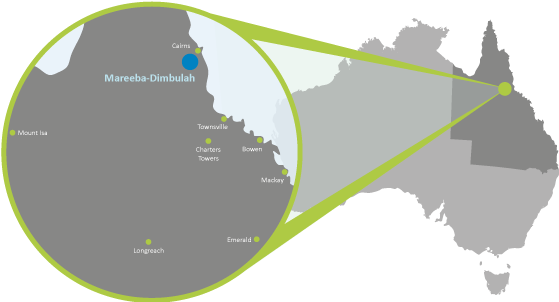Mareeba Dimbulah
Past review
15/05/2012
The Mareeba Dimbulah water supply scheme is located on the Atherton Tablelands.
The scheme has 1,136 bulk water customers and incorporates the Mareeba-Dimbulah distribution system, which services 1,008 customers.
The principal water storage is the Tinaroo Falls Dam, which holds up to 438,920ML.
The scheme supplies a number of townships including Tinaroo, Walkamin, Mareeba, Kuranda, Mutchilba, Dimbulah and Yungaburra.
Irrigation uses of water include: sugarcane, mangoes, bananas, pawpaw, citrus, avocados, other horticulture and coffee.
The Mareeba Dimbulah distribution system diverts water from the Tinaroo Falls Dam to five major sub-systems: Tinaroo, Walkamin, Dimbulah, Mareeba and Paddy’s Green.
These systems include 375 km of channels and pipelines and 61 km of drains.

The QCA’s recommended irrigation prices to apply to the Mareeba Dimbulah bulk water supply scheme and Marrreba-Dimbulah distribution system for the 2012–17 regulatory period were published in May 2012.
They are described in the Executive summary of our Final Report, which can be found below.
These recommendations were accepted by the Queensland Government, and the new price path came into effect on 1 July 2012.
This SunWater water scheme review forms part of the review that the QCA undertook in 2011-12 for the Queensland Government: the SunWater Irrigation Price Review 2012–17.
You can read more about the pricing review on our project home page. You can also view the submissions for the water schemes that we received, the consultants’ reports and issues arising from face-to-face consultation with stakeholders.
We recommended a new irrigation price path, to apply from July 2012 to June 2017 – with prices moving in a direction that better reflect costs. For the majority of schemes, our recommended prices result in increases to fixed prices and reductions in usage prices.
The irrigation revenue earned by SunWater in some schemes does not cover the cost of operating and maintaining irrigation assets. In these schemes, QCA could show the ‘cost-reflective’ price, but could only recommend prices that increased by up to $2/ML per year plus inflation.
The QCA’s recommended prices were accepted by the government.